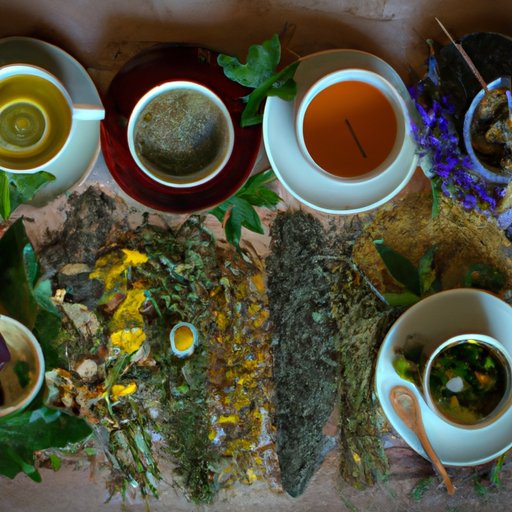Introduction
Herbal teas have been used for centuries as a way to promote health and wellness. But what exactly are herbal teas, and what makes them so beneficial? In this article, we’ll explore the health benefits of herbal teas, their nutritional values, and the potential risks associated with drinking them. By the end, you’ll have a better understanding of how herbal teas can help improve your overall health.
Definition of Herbal Tea
Herbal teas, also known as tisanes or infusions, are beverages made from a variety of herbs, spices, flowers, and other plants. Unlike traditional black or green tea, herbal teas do not contain any caffeine. Instead, they are made using only water and various plant materials, which are steeped in hot water. The resulting beverage is naturally caffeine-free and full of antioxidants, vitamins, and minerals.
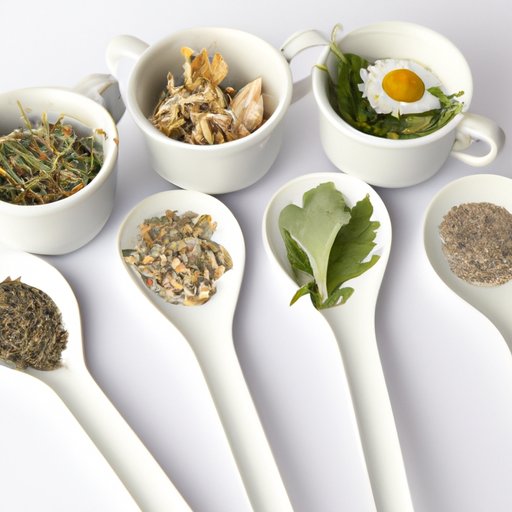
Overview of the Health Benefits of Herbal Teas
Herbal teas are widely recognized for their many health benefits. Studies have shown that these teas can help reduce inflammation, lower blood pressure, boost immunity, and improve digestion. Additionally, some herbal teas may even be able to help with stress relief and improved sleep quality. Let’s take a closer look at some of the specific health benefits of herbal teas.
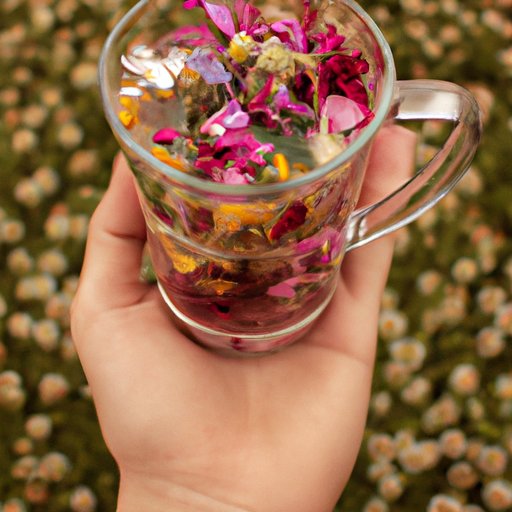
Exploring the Health Benefits of Herbal Teas
Antioxidant Content
One of the biggest benefits of herbal teas is their high antioxidant content. Antioxidants are compounds that can help protect against oxidative stress, which can damage cells and increase the risk of diseases like cancer, heart disease, and diabetes. Herbal teas are packed with powerful antioxidants that can help protect against these diseases and promote overall health.
Anti-inflammatory Effects
Inflammation can lead to a number of health issues such as joint pain, muscle aches, and fatigue. Fortunately, many herbal teas have anti-inflammatory properties that can help reduce inflammation and alleviate symptoms. For example, chamomile tea has been found to have anti-inflammatory effects and can help reduce pain and swelling.
Potential to Lower Blood Pressure
High blood pressure is a serious condition that can increase the risk of stroke, heart attack, and other cardiovascular diseases. Several studies have found that certain herbal teas, such as hibiscus tea, can help lower blood pressure. Drinking two to three cups of hibiscus tea per day has been shown to significantly reduce systolic and diastolic blood pressure.
The Different Types of Herbal Teas and Their Nutritional Values
Chamomile
Chamomile tea is one of the most popular types of herbal tea. It has a mild, slightly sweet flavor and is packed with antioxidants and nutrients such as calcium, magnesium, and potassium. Chamomile tea is also known for its calming and relaxing effects, making it a great choice for those looking to reduce stress and improve sleep quality.
Peppermint
Peppermint tea is another popular type of herbal tea. It has a refreshing, minty flavor and contains menthol, which can help reduce nausea, relieve headaches, and reduce congestion. Peppermint tea is also rich in antioxidants and has anti-inflammatory properties that can help reduce inflammation and fight off infections.
Hibiscus
Hibiscus tea has a tart, fruity flavor and is often used as a natural remedy for high blood pressure. It is also high in antioxidants, vitamin C, and minerals such as iron and calcium. Additionally, hibiscus tea has been found to have antimicrobial and antiviral properties, making it a great choice for boosting immunity.
Ginger
Ginger tea is a spicy, flavorful tea that has been used for centuries to treat a variety of ailments. It is rich in antioxidants and can help reduce inflammation, fight infections, and improve digestion. Additionally, ginger tea is often used to help relieve nausea, reduce muscle pain, and boost immunity.
Rooibos
Rooibos tea is a South African herbal tea that has a sweet, earthy flavor. It is naturally caffeine-free and contains high levels of antioxidants, minerals, and vitamins. Rooibos tea has been found to have anti-inflammatory and anti-allergy properties, making it a great choice for those looking to reduce inflammation and fight off allergies.
How Herbal Teas Can Help Improve Your Digestive Health
Stimulating Digestion
Drinking herbal teas can help stimulate digestion and improve overall digestive health. Many herbal teas, such as peppermint and ginger tea, are known for their ability to reduce bloating and improve digestion. Additionally, some herbal teas, such as chamomile tea, have been found to have antispasmodic properties that can help relax the muscles in the digestive tract and reduce cramping.
Reducing Bloating
Bloating is a common digestive issue that can be uncomfortable and embarrassing. Fortunately, certain herbal teas, such as peppermint and fennel tea, can help reduce bloating and improve digestion. These teas contain compounds that can help relax the muscles in the digestive tract and reduce gas and bloating.
Fighting Nausea
Nausea can be caused by a variety of factors, such as motion sickness, pregnancy, and food poisoning. Fortunately, some herbal teas, such as ginger tea, have been found to reduce nausea and vomiting. Ginger tea is rich in antioxidants and can help reduce inflammation and improve digestion, which can help ease nausea.
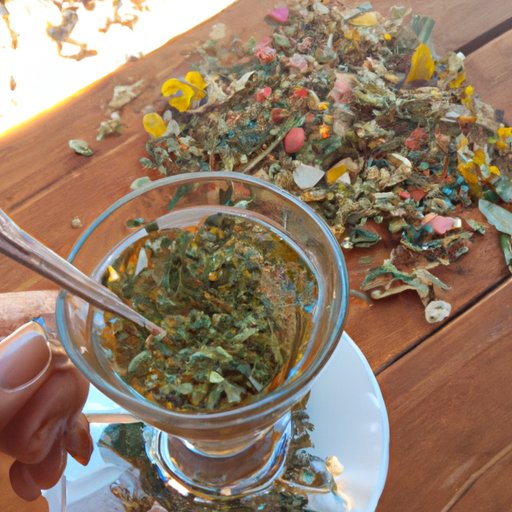
Reasons to Start Drinking Herbal Teas Every Day
Stress Relief
Many herbal teas, such as chamomile and lavender tea, are known for their calming and relaxing effects. Drinking these teas can help reduce stress and anxiety, as well as improve mood and overall wellbeing. Additionally, some herbal teas, such as lemon balm tea, have been found to help reduce cortisol levels, which can help lower stress levels.
Improved Sleep Quality
Poor sleep can lead to a variety of health issues, including fatigue and difficulty concentrating. Fortunately, certain herbal teas, such as valerian root tea, can help improve sleep quality. Valerian root tea is known for its sedative effects and can help reduce insomnia and improve sleep quality.
Boosting Immunity
Herbal teas can also help boost immunity. Many herbal teas, such as elderberry tea, are rich in antioxidants and can help reduce inflammation, fight infections, and protect against disease. Additionally, some herbal teas, such as echinacea tea, have been found to have antiviral and antibacterial properties, making them great for fighting colds and flus.
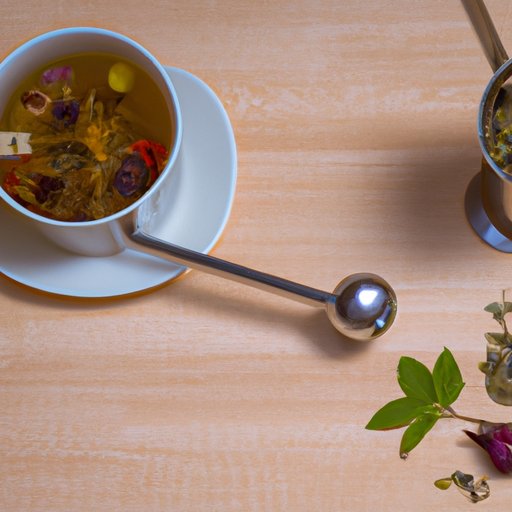
Understanding the Risks of Consuming Herbal Teas
Interaction with Medication
It’s important to note that some herbal teas can interact with certain medications. For example, St. John’s wort tea can interfere with birth control pills, while ginseng tea can interact with blood thinners. Additionally, some herbal teas, such as ephedra tea, can be dangerous if consumed in large amounts. If you’re taking any medications, it’s best to consult your doctor before consuming any herbal teas.
Caffeine Content
It’s important to note that some herbal teas, such as yerba mate and guayusa, contain small amounts of caffeine. While these teas are generally considered to be safe, it’s important to keep track of your caffeine intake to avoid side effects such as jitteriness and headaches. Additionally, if you’re sensitive to caffeine, it’s best to stick to caffeine-free herbal teas.
Allergy Concerns
Some people may be allergic to certain herbs and plants used in herbal teas. If you’re allergic to a particular herb or plant, it’s important to avoid drinking teas containing that ingredient. Additionally, it’s best to start with small amounts of a new herbal tea to make sure you don’t have an allergic reaction.
Choosing the Right Herbal Tea for Your Needs
Consider Personal Preferences
When choosing an herbal tea, it’s important to consider your personal preferences. Everyone’s tastes and preferences are different, so it’s important to find a tea that you enjoy drinking. There are many different types of herbal teas available, so take some time to explore and find one that you love.
Understand Tastes and Flavors
It’s also important to understand the different tastes and flavors of herbal teas. Some herbal teas, such as chamomile and peppermint tea, have a mild flavor, while others, such as hibiscus and ginger tea, have a more intense taste. Understanding the different flavors of herbal teas can help you choose one that you enjoy drinking.
Research the Health Benefits
Finally, it’s important to research the health benefits of each herbal tea. Different herbal teas have different health benefits, so it’s important to find one that meets your needs. Additionally, it’s important to understand the potential risks associated with each type of tea, as well as any interactions with medications.
Conclusion
Herbal teas offer numerous health benefits, including antioxidant content, anti-inflammatory effects, improved digestion, and stress relief. When choosing an herbal tea, it’s important to consider your personal preferences, understand the different tastes and flavors, and research the health benefits and potential risks. With the right knowledge and understanding, herbal teas can be a great addition to your daily routine.
(Note: Is this article not meeting your expectations? Do you have knowledge or insights to share? Unlock new opportunities and expand your reach by joining our authors team. Click Registration to join us and share your expertise with our readers.)
